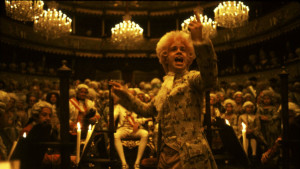Even a layman not in tune with the history of classical music can most certainly identify a famous composer or two if pressed. Wolfgang Amadeus Mozart would surely fall at the top of everyone’s list. In 1984, Czech director Milos Forman teamed with English playwright Peter Shaffer to create a historic film that would go on to win eight Academy Awards, including Best Picture.
Loosely based on an 1830 Alexander Pushkin play, “Amadeus” focuses on the arrival of a young Mozart in Vienna, his irreverent musical and personal style, and his mysterious death at the age of thirty-five – possibly at the hands of his envious artistic rival, Italian composer Antonio Salieri.
“Amadeus” opens in a frigid Vienna in 1823. Italian composer Antonio Salieri (F. Murray Araham) has been placed in an asylum after a suicide attempt, riddled with a guilt he has harbored for over thirty years. Salieri is visited by Father Vogler (Richard Frank) where he proceeds to recant the details of the past via flashbacks.
Salieri is employed as the court composer for Holy Roman Emperor Joseph II (Jeffrey Jones) in 1781 when introduced to a fresh and boisterous Mozart (Tom Hulce). The overly pious Salieri is expecting the young composer to be humble and consumed with tradition. Salieri is dismayed when the uncouth and flamboyant Mozart immediately upstages him in an innocent and tactless way by demonstrating his prowess at the helm of a piano and the simplicity of Salieri’s own work. In a Don Corleone way, Salieri plots to ruin Mozart by befriending him, all the while concealing a decade of seething hatred and bitter envy.

“Amadeus” plays out like a modern day opera; with layers of classical music throughout (taking the award for Best Sound Mixing) and ornate characters. F. Murray Abraham and Tom Hulce deliver breathtaking performances as they portray characters that, though everyone knows by name, no one really knows great detail about. As a result, whether accurate or not, the viewer will get a perfect glimpse of the way these men were and acted towards each other in the decade of the 1780s.
“Amadeus” also contains elements of a modern day theme – that of true art selling out for the masses. Though Salieri is a gifted composer, he has taken a profitable and steady position in the emperor’s court, limiting his ability to be a true musical entity. Mozart’s character is one who strives and suffers for his music. Despite having a pregnant wife (Elizabeth Berridge) and a stern father (Roy Dotrice) one gets the impression Mozart would sooner starve to death on the streets than give up his art. As such, Salieri is filled with a combination of resentment and envy, but also appreciation for the music he wishes he could create. “Through my influence,” Salieri confesses to Father Vogler, “I saw to it that Don Giovanni was played only five times in Vienna. But in secret, I went to every one of those five. Worshiping sounds I alone seemed to hear.”
Abraham brings the resentment and jealousy of Antonio Salieri through the screen, as he hatches his complex plot to obtain revenge against his musical rival in a tactical and deceiving way. Hulce makes the character of Wolfgang Amadeus Mozart his own.With mannerisms akin to today’s most eccentric artists (including an immature and perfectly grading giggle that eats away at Salieri) Hulce’s performance will intrigue you about the details of the real life composer. In a twist of irony, the rivalry would continue when Abraham and Hulce would both be nominated for Best Actor in a Leading Role (with Abraham taking the honor).
“Amadeus” has two major flaws. Unlike another composer-centric film “Immortal Beloved,” the storyis a mixture of urban legend, conjecture, and fiction. Though the untimely death of Mozart has been a focus of intrigue for 224 years, the specific details have not been ascertained. While “Amadeus” does not claim to be a truly biographical picture, it can be easy for one to lose that notion while watching the movie (kudos to the set, costumes, and performances). It is more of an opera style piece where a story is told and hefty liberties are taken in route to getting there. And at a running time of 160 minutes (I was required to flip the disc over midway) it’s just too long to be a non-biographical film.
Despite the issues mentioned above, “Amadeus” is a good film and enjoyable to watch. Fans of classical music will no doubt enjoy the score and the period it is set in. And the performances of the two stop stars is a thing of unbridled beauty which will render you mesmerized.
by – Matt Christopher